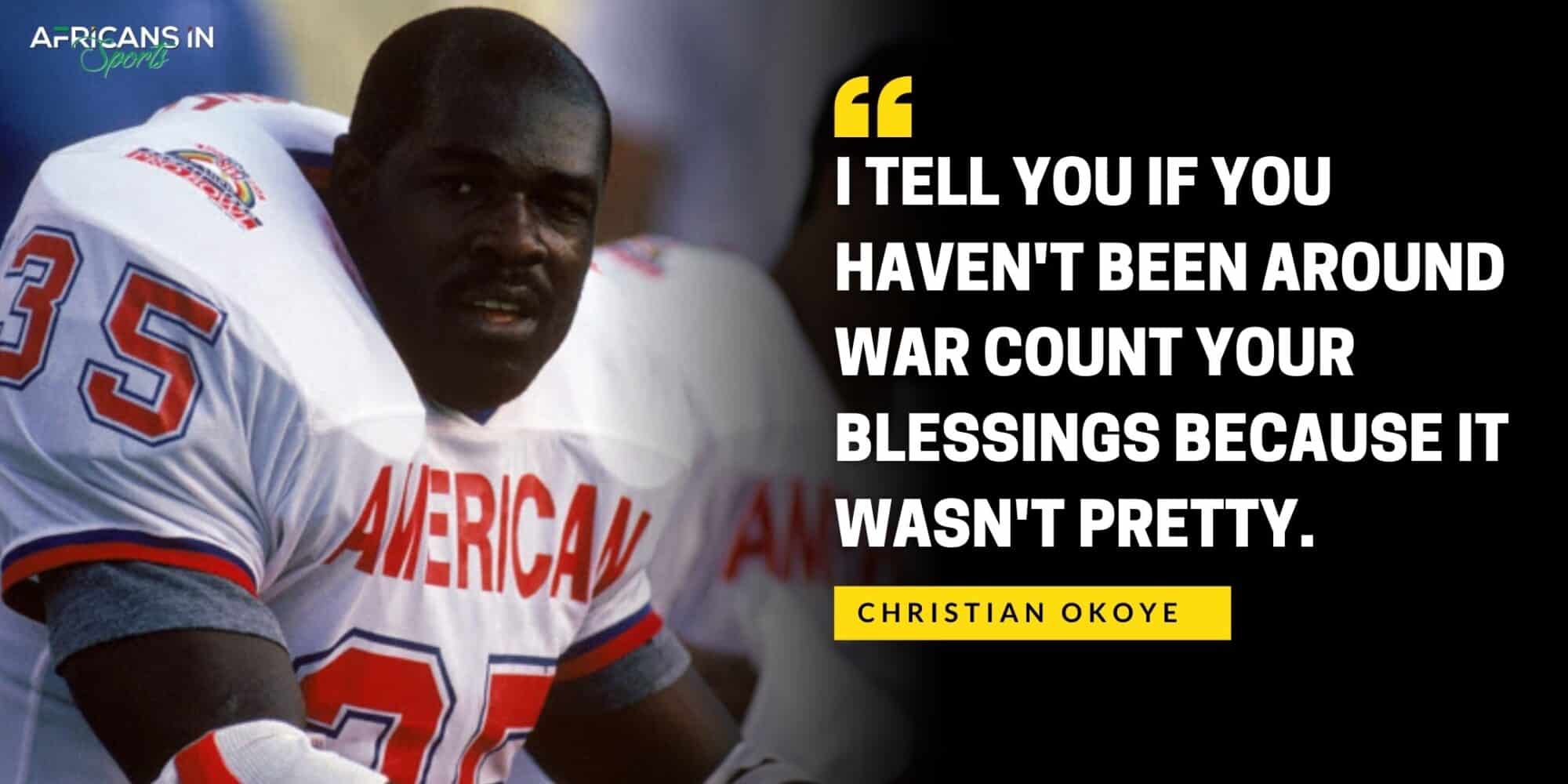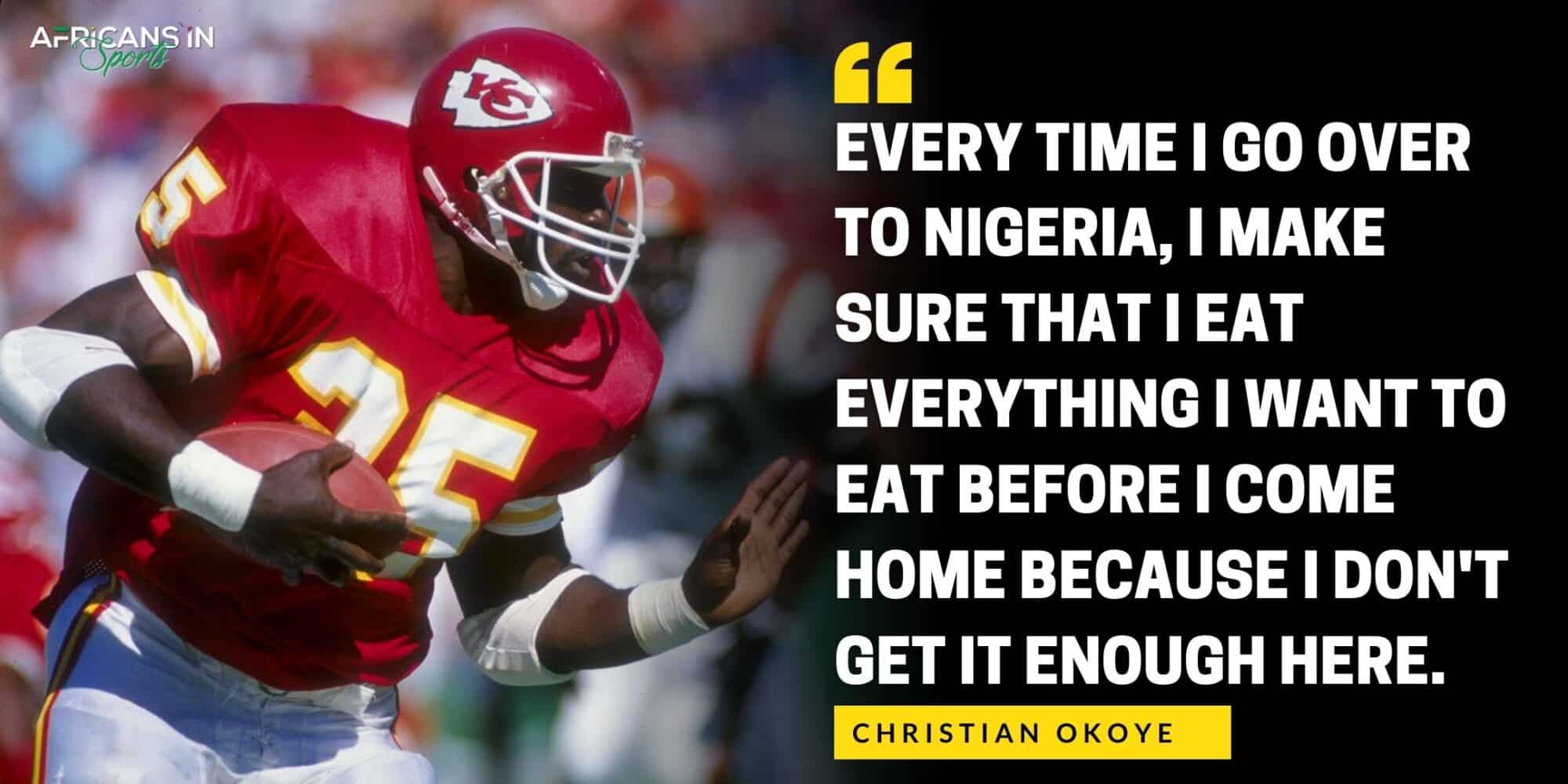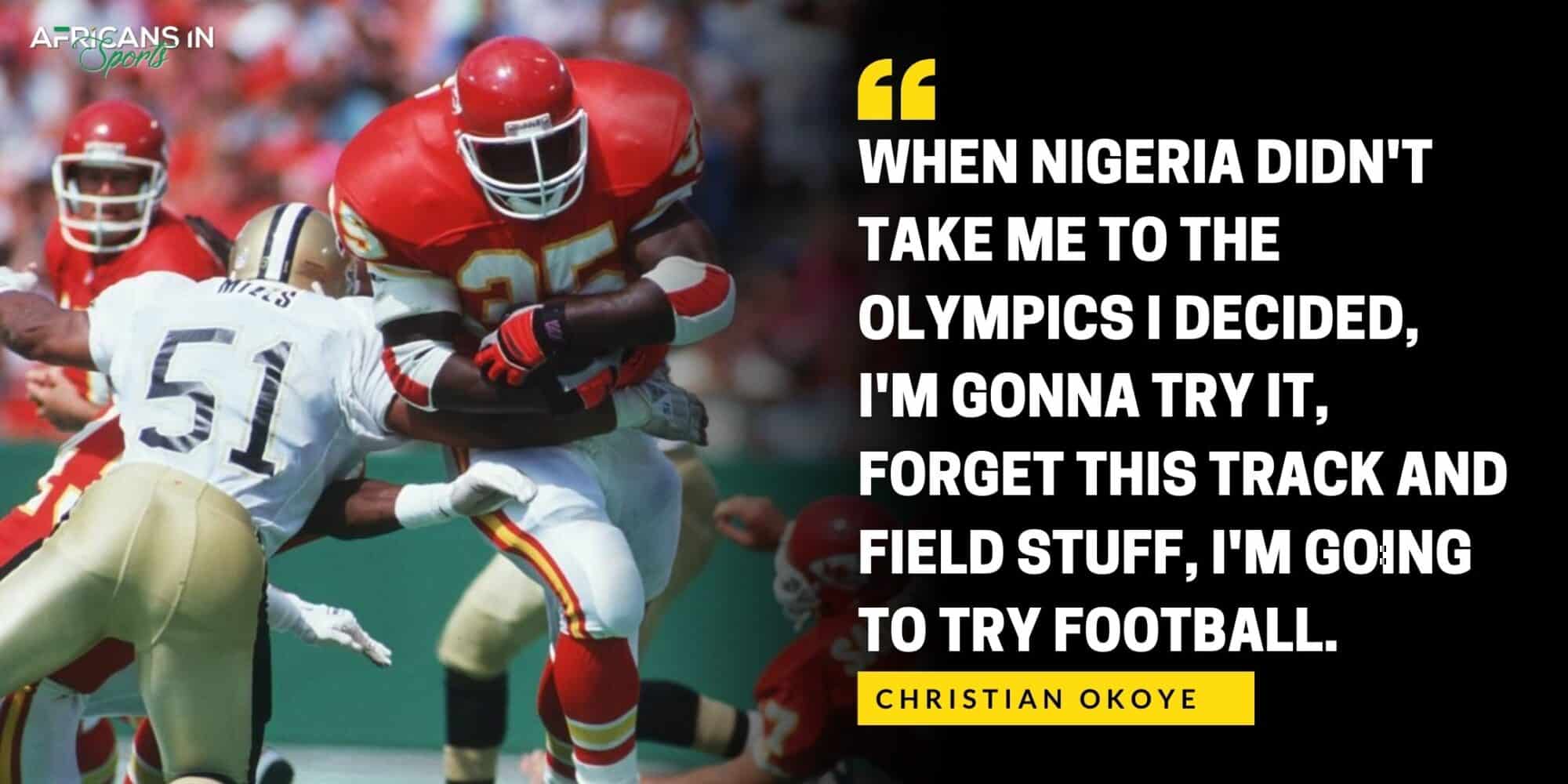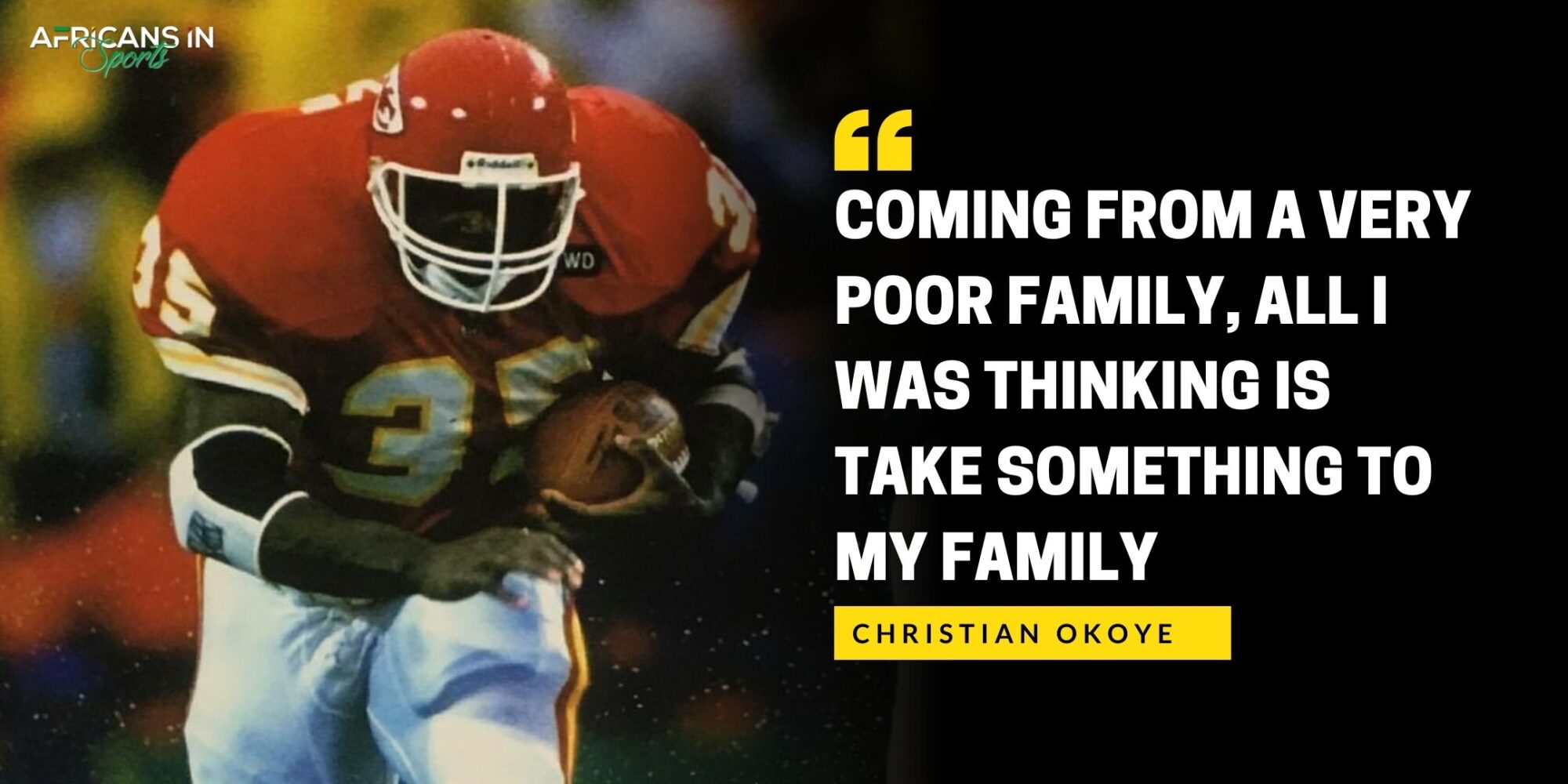Christian Okoye: “If You Haven’t Been Around War Count Your Blessings”
Former NFL superstar running back, Christian Okoye sits with his namesake, Chris ‘COSeezy’ Strachan to discuss his life, upbringing and career in an interesting episode of Africans in Sports.
Born in Nigeria, Okoye described his childhood as “Well you know, Nigeria it was rough, especially when you’re on the poor side, I grew up extremely poor, I grew up during the time we had the civil war and I tell you if you haven’t been around war count your blessings because it wasn’t pretty.”

“I got into sports playing soccer, then I got bigger and bigger and I couldn’t play soccer anymore so I got into track and field, and I came to the United States and switched to football, and the rest is history.”
Christian Okoye then goes on to mention his pride in being able to succeed and let his father witness his success especially after the tough childhood which he grew up poor.
“I came from a family of seven kids, my oldest brother has passed away, both of my parents have passed away now but I’m so glad that my dad was able to come out here after my rookie year.”
“I took him to the 101 banquet here in Kansas City, an NFL awards banquet and he saw me receive my Rookie of the Year Award and some of the MVP things and he was proud of me.”
Okoye who is nicknamed ‘The Nigerian Nightmare’ because he was a beast on the field, share some of his eating habits and favourite foods with us.
“Soup is my go-to, and the jollof rice, it’s all these things man, every time I go over to Nigeria, I make sure that I eat everything I want to eat before I come home, because I don’t get it enough here.”
Speaking about Nigeria, he said, “I try to go back once a year, especially with the program that I have with kids out there, just go back and checking on how things are going, and try to bring some motivation to the kids, showing them some of the things happening in America so that they can identify and set their goals, that’s important.”

“In Nigeria, there’s a lot of people out there, a lot of kids running out on the streets and stuff, of course, education is extremely important, for them to have a purpose in life it’s extremely important, we try to teach them that.”
“That’s the mission of the organisation, our motto is education through sports, the Christian Okoye foundation, we bring them in through sports.” He added about the point of his nonprofit organisation.
Christian Okoye goes deeper into his life history, helping us to navigate his career path and he tells us why exactly he chose to play American football.
“In Nigeria for me, in the elementary school I was playing soccer and then in secondary school, which is high school over there I was playing soccer, but like I said I was getting bigger and bigger so I had to switch to track and field.”
“I was doing the hurdles and growing, I switched to field events, I was throwing the discus and the shot put, and it was actually the shot put and discus that brought me to America.”
“Because I got good enough that I was representing Nigeria in the African games and so on and so forth, and then a friend of mine who was going to a school in California spoke to the coach out there, at Azusa Pacific and they gave me a scholarship to come out here.”
He further elaborates on his time in the United States, in the early days and how his goals differ completely from what happened to him.
“When I came to the country in 82′ I knew that Olympics was set to take place in Los Angeles in 84′, and I decided that I’m gonna be in that Olympics, that’s my goal, I’m gonna be in it and I’m throwing discus in it, so I was working extremely hard.”
“Like I said, I was weighing 282 pounds, and I grew my weight from 214 to 282, so before the Olympics, I was throwing the discus all over the place and in the summertime, I would travel to Europe and throw it with some of these Germans and US throwers.”
“When the Olympics came around, and I’m thinking we’re gonna do the same thing, I’m gonna be in it and these guys that I’ve been throwing with they’re gonna be there, so I was confident that I would get something, that I would be there at the finals, so when Nigeria didn’t take me, just think the disappointment that I was feeling at the time.”
“When Nigeria didn’t take me to the Olympics I decided, I’m gonna try it, forget this track and field stuff, I’m gonna try football, so I went to the coach’s offices and said I’m gonna play.”

After switching sports in college, Okoye declared for the draft and was selected in the 2nd round. He talks us through the process of the draft.
“I was at my coach’s house with the tv cameras, waiting for my name to be called, and it was called, Kansas city called me and said ‘we’re gonna take you in the 2nd round, how do you feel about that?’ And I said oh, ‘I’m excited’.”
Family clearly means a lot to Okoye, “Of course, coming from a very poor family, all I was thinking is take something to my family, make sure my family will be comfortable because I’m doing well now.”
“I tried to make sure my family was comfortable in Nigeria, and you know in life if you achieve a goal, that doesn’t mean you’re gonna die, you have to set more goals.”

On being the first African player in the NFL’s history, Christian Okoye explains how the milestone made him feel and the sort of impact it has had on young African and Nigerian players aspiring to make it to or already in the NFL.
“It means a lot, because again, I go to a lot of NFL functions and I see all these guys and they come up to me and shake my hand and give me a hug and stuff like that for being who I was.”
“That’s life though, somebody has to be the first right, and I was blessed to be the first and these guys are doing what they do and I’m extremely proud of them.”
The Nigerian nightmare was a constant problem for all his oppositions, but he retired at the age of 31, pretty early for a player of his calibre. Still, he explains the circumstances surrounding his shocking decision.
“Injuries of course played a part in my retiring buy it wasn’t enough to force my retirement, I just decided at the age of 31 that football was enough, you know.”
“I wanted to be a teacher, you know, work with kids, but I decided I’m gonna focus on the nonprofit, my foundation and try to help other kids.”
His advice for young Nigerians is direct and straightforward to the point, pretty much how he was in his playing days.
“I tell them, education is first, just like my parents told us and every other Nigerian parent will tell their kids, and then if you’re playing sports, you make sure that you’re doing all the right things.”
“You’re training and you’re training right, training to always win, when you lose you make sure that you put in the best effort, don’t hang your head, if you hang your head that means you didn’t train well, that’s what I always believe.”
